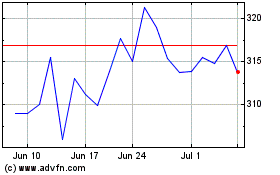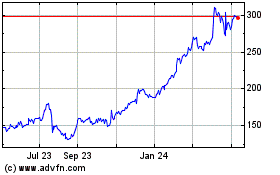Spotify to Suspend Political Advertising
December 27 2019 - 4:46PM
Dow Jones News
By Patience Haggin
Spotify Technology SA said it would stop selling political
advertising in early 2020 because it lacks the appropriate tools to
review them, a move that comes as many digital platforms selling
such ads face growing criticism for helping spread
misinformation.
"At this point in time, we do not yet have the necessary level
of robustness in our processes, systems and tools to responsibly
validate and review this content. We will reassess this decision as
we continue to evolve our capabilities," a Spotify spokeswoman
said.
The spokeswoman declined to say what review process the digital
music service implemented for political ads in the 2016 and 2018
election cycles, and declined to specify whether the move was
motivated by concerns about foreign meddling.
Spotify opened a political-advertising department in mid-2016,
former Spotify employees said. Executives had previously been
concerned that political ads could bother Spotify's listeners and
lead to negative feedback, one of the people said. Spotify required
its employees to manually monitor the "creative," or details, of
the political ads before they ran, the person said.
Spotify's decision comes shortly after companies with larger
digital-ad businesses have announced changes to the way they vet
political ads. In October, Twitter Inc. said it would stop selling
political ads, and weeks later Alphabet Inc.-owned Google said it
would limit political-ad buyers' ability to target their
audiences.
Facebook Inc. in October said it won't fact-check ads run by
politicians, but the company has since weighed further changes to
its political-advertising policy, including its own restrictions on
targeting users.
Spending on political ads increasingly is shifting online --
where groups can target narrow slices of voters and regulators have
little oversight. Digital political-ad spending is expected to
reach $2.9 billion in 2020, more than doubling from $1.4 billion in
2016, according to Borrell Associates Inc., a consulting firm.
Watchdogs, including lawmakers, technology executives and
advocacy groups, have called for greater transparency in political
ads following revelations that Russian entities purchased digital
ads designed to influence the 2016 U.S. vote, including a
coordinated effort to spread misinformation.
"Companies are trying to grapple with the fact that ads can be
used to spread misinformation," said Katherine Haenschen, an
assistant professor at Virginia Tech who studies digital
advertising on tech platforms. "For a little bit of money, you can
lie to a lot of people."
Prof. Haenschen said the most effective way to stop
misinformation is not run untrue political ads, but that puts
companies in the position of having to decide what is true and what
isn't. "So they sidestep the question by just saying 'no political
ads.' "
A person familiar with Spotify's policy said the company defines
political ads as those purchased by, or that advocate for or
against, candidates for office, elected officials, appointed
officials, political parties, political action committees, super
PACs and nonprofits operated to promote social welfare, known as
501c4 organizations. It also applies to ads that advocate for or
against legislative or judicial outcomes.
Much like Twitter's policy, Spotify's move appears to leave the
door open to "issue ads," or messages designed to influence opinion
on a political or social matter, but that don't advocate for an
electoral outcome, Prof. Haenschen said.
Political ads, which Spotify sells only in the U.S., haven't
been a significant revenue stream for the company, people familiar
with the matter said.
Spotify's move will cut off what was already a narrow channel
for major political campaigns. Presidential hopeful Sen. Elizabeth
Warren, for example, spent about $44,000 on Spotify ads in the
first three quarters of 2019, according to filings with the Federal
Election Commission. She reported spending more than $2.8 million
on Facebook during the same period.
Pete Buttigieg's presidential campaign said it has advertised on
Spotify. So have the Democratic Congressional Campaign Committee
and Nebraska Sen. Ben Sasse, according to FEC filings. Sen. Bernie
Sanders, who is running in the Democratic presidential primaries,
and the Republican National Committee have also purchased ads on
Spotify, said the person familiar with the company.
--Emily Glazer contributed to this article.
Write to Patience Haggin at patience.haggin@wsj.com
(END) Dow Jones Newswires
December 27, 2019 16:31 ET (21:31 GMT)
Copyright (c) 2019 Dow Jones & Company, Inc.
Spotify Technology (NYSE:SPOT)
Historical Stock Chart
From Oct 2024 to Nov 2024

Spotify Technology (NYSE:SPOT)
Historical Stock Chart
From Nov 2023 to Nov 2024
